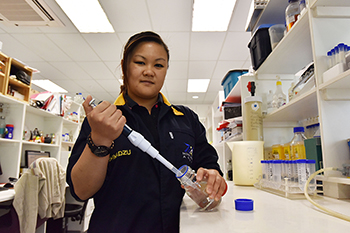Latest News Archive
Please select Category, Year, and then Month to display items
17 May 2024
|
Story Anthony Mthembu
|
Photo Supplied
 Prof Magdalena Sobon from Poland and Michael Jackson Blebo from Ghana shared their expertise with staff and students during their visit to the Department of Fine Arts at the University of the Free State.
Prof Magdalena Sobon from Poland and Michael Jackson Blebo from Ghana shared their expertise with staff and students during their visit to the Department of Fine Arts at the University of the Free State.
In a concerted effort to solidify its identity in South Africa and abroad, the Department of Fine Arts at the University of the Free State (UFS) recently played host to two distinguished artists: Prof Magdalena Sobon from the Wladyslaw Strzeminski Academy of Fine Arts in Lodz, and the Ghanaian multidisciplinary artist, Michael Jackson Blebo.
Dr Adelheid Von Maltitz, Senior Lecturer in the Department of Fine Arts at UFS, lauded the visits, held between 19 and 29 March 2024, as an enriching learning experience for the faculty and students within the department.
The visit highlights
During their visit to UFS, Prof Sobon and Blebo actively engaged with the department’s staff and students. Prof Sobon, an acknowledged paper-making artist, conducted a comprehensive two-day workshop, imparting extensive knowledge in this craft. As a direct outcome of this workshop, the department has procured the requisite equipment and materials, enriching the students’ capabilities in this medium. Blebo on the other hand, conducted a demonstration on clay bust modelling and both artists participated in critique sessions with the fourth-year students. Dr Von Maltitz underlined the significance of Blebo’s African heritage, noting, ‘’For our students to interact with a young, accomplished artist of his calibre is of benefit to them in terms of how they may envision their art careers.’’ Of particular note were Prof Sobon’s interactions with the students, wherein she shared her own artistic practices from her student years during her lectures.
In addition to their engagements with the students, Prof Sobon and Blebo also had the opportunity to present their research to second-year sculpture students at the Richmond Land Art Project, an off-campus initiative fostering art creation centred on socio-economic and other pertinent issues.
Future collaborations
Dr Von Maltitz emphasised the importance of maintaining ties with these eminent artists for the department’s growth and global outreach. Prof Sobon’s visit has paved the way for two department members to visit the Wladyslaw Strzeminski Academy of Fine Arts in Lodz in the near future. ‘’These individuals will get an opportunity to learn about studio setups and network with fellow academics, creative researchers, and artists,’’ stated Dr Von Maltitz. She hailed the visit by the two artists as both stimulating and fruitful, particularly for the students.
The impact of personal care products on water resources in the Free State
2015-12-14

Jou-an Chen
Photo: Charl Devenish
|
Water is of the utmost importance in personal hygiene. Most people can hardly have a day go by without taking a shower in the morning and at night. However, it is this very habit that is increasingly polluting the water resources in South Africa.
Contaminants found in pharmaceutical and personal care products have been accumulating in water masses in recent years. These contaminants especially refer to hormones in medication, as well as colouring agents and fragrances used in soap, shampoo and body lotions.
“Little information and data are available on the prevalence of these contaminants, and on how high the level of pollution really is,” says Jou-an Chen, researcher in the Department of Microbial, Biochemical and Food Biotechnology at the UFS.
Her research particularly focuses on the prevalence and impact of those contaminants.
“Because these substances have not been properly investigated, we are not sure how widely it occurs and whether it is harmful to the environment. It was precisely the lack of information that has inspired me to investigate further.”
“If we could identify the contaminants and what it is doing to the environment, it could make a valuable contribution to directives on water quality standards.”